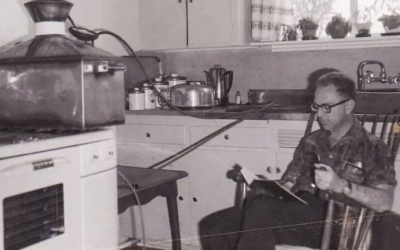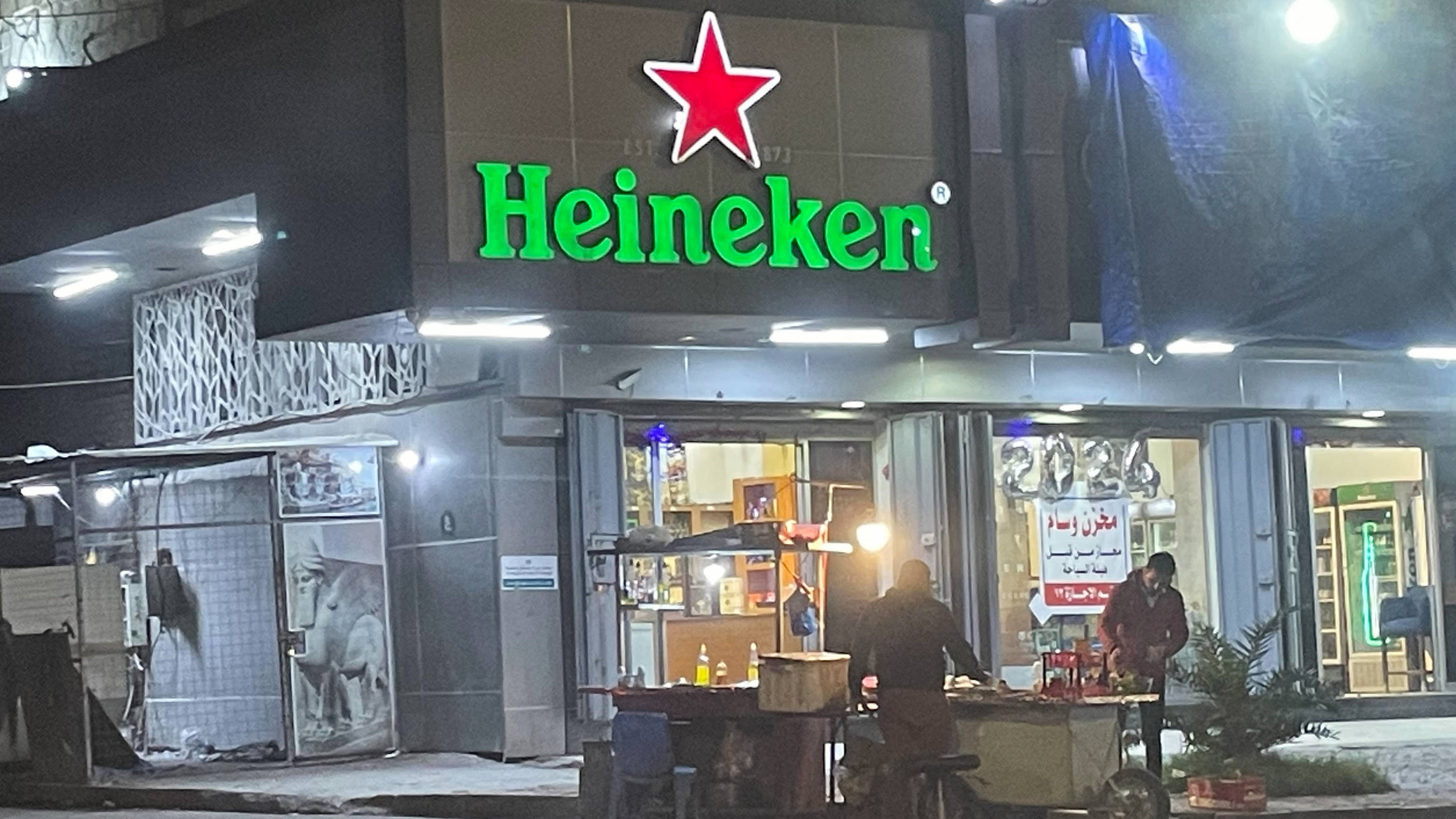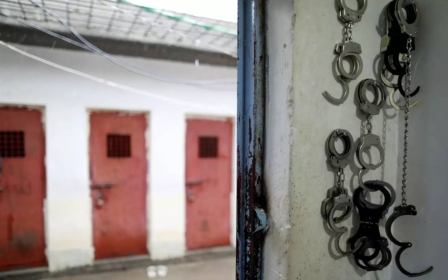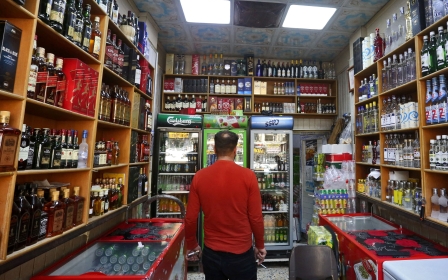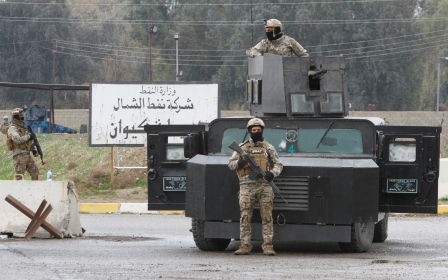The illegal alcohol merchants of Baghdad
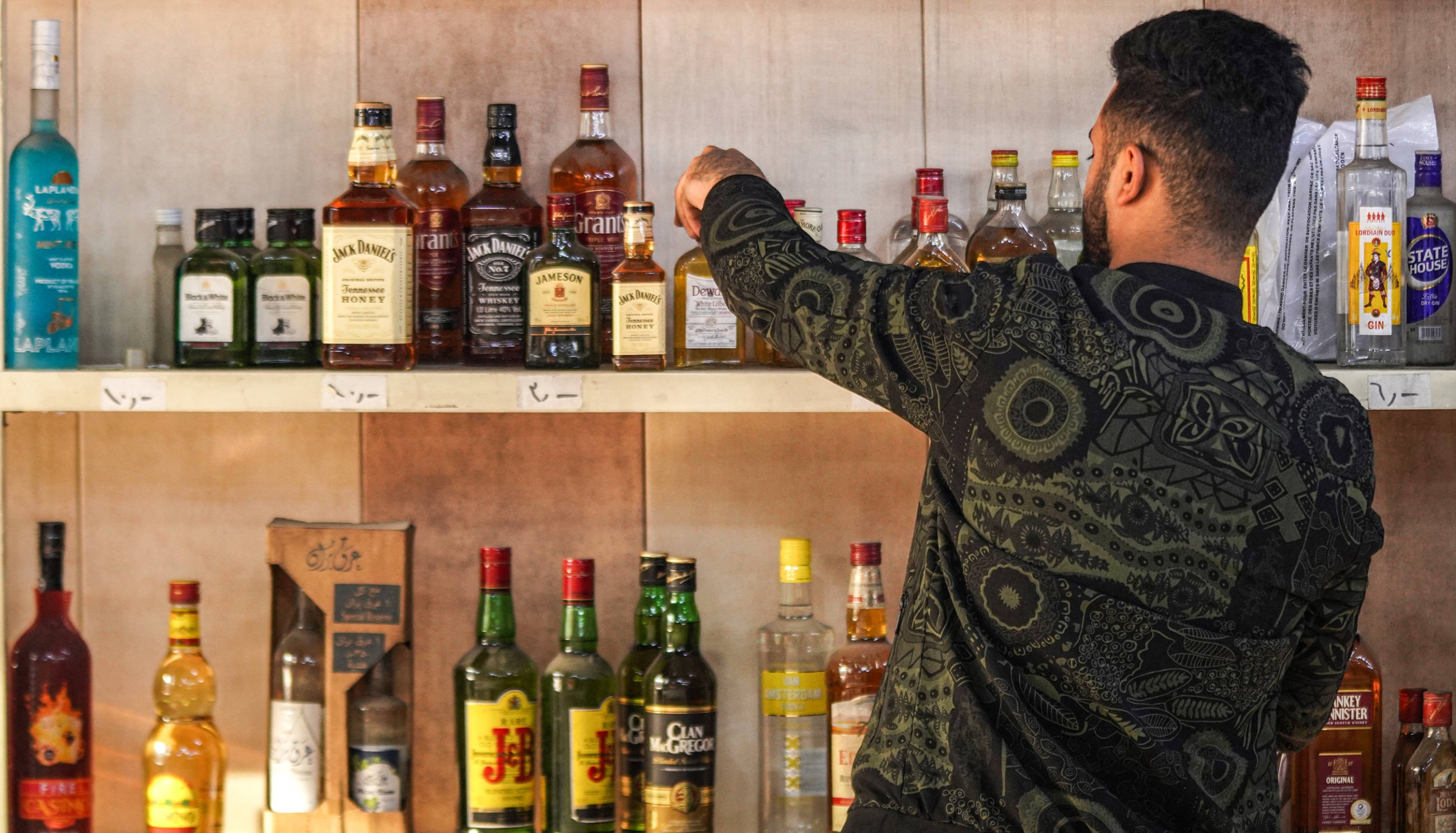
Behind the broad metal doors of an innocuous-looking building in a residential neighbourhood of central Baghdad, thousands of crates of alcohol are stacked up to the high rafters.
Towers of famous international brands rise alongside locally-made beverages, meticulously arranged according to alcohol types. Corridors run between walls of crates and boxes, leading from room to room, revealing a highly organised and extremely well-stocked warehouse.
Exclusively Christian staff are busy, organising alcohol stores and loading deliveries. These are mostly destined for Baghdad's alcohol outlets, bars and nightclubs, but some, hidden in civilian vehicles, will head further south, to be smuggled into Iraq's Shia heartlands.
"We are still operating, but in an illegal way," said owner Tony, who has worked in the alcohol trade for more than 30 years. He said that, since the law banning alcohol imports and sales was passed in March 2023, everything now was done with bribes.
Alongside higher taxes, paying out hefty bribes at every checkpoint is now the principal expense faced by what has become a clandestine industry.
New MEE newsletter: Jerusalem Dispatch
Sign up to get the latest insights and analysis on Israel-Palestine, alongside Turkey Unpacked and other MEE newsletters
All alcohol enters the country through Iraqi Kurdistan, as the semi-autonomous Kurdish Regional Government, which controls its own land borders, is not enforcing the legislation. From there, it is trucked down to Baghdad, past about half-a-dozen checkpoints, each requiring payment.
Alcohol trader Samir said: "It used to cost around $3,000 to move a lorry-load of alcohol from Kurdistan to Baghdad, but now the average is $50,000 because we have to pay taxes and then we have to pay at each checkpoint we pass, and you're talking about six or seven checkpoints on every journey."
Such checkpoints have become so lucrative that military commanders are said to pay their own internal bribes to be assigned to specific checkpoints along routes used by trucks transporting alcohol supplies towards the capital.
Despite the ban, trade licences must also be obtained. "We still have to apply and pay, but we don't get any receipts or official paperwork now," said Tony.
He showed one of the few documents now issued, permitting small trucks laden with booze to traverse Baghdad. He described it as "official but unofficial", shrugging with resignation that this is now just how things are.
The Baghdad warehouse stocks several local beer brands, made in the few Iraqi breweries still operating in northern Iraq, but these face similar challenges.
One brewer, speaking on condition of anonymity, said: "The factory is still running because I pay. For this year, I've paid taxes and paid for the licence but without any paper trail."
Baghdad's alcohol scene
Iraq has a long history of alcohol consumption, with ancient Mesopotamia credited with having invented beer and former Iraqi leader Saddam Hussein reportedly referring to whisky as "Iraq's national drink".
The country's minority Christians and Yazidis have worked Iraq's alcohol industry for a century, after laws passed in the 1920s permitted this activity only for non-Muslims.
"The government started making it very difficult to renew alcohol licences from 2009," Samir told MEE.
"For the following five years it was very difficult to get licences, and people either stopped or worked illegally. Then, around 2016, it started getting easier again."
After Iraq's 2017 defeat of the Islamic State militant group (IS), Baghdad's alcohol scene flourished.
Unmarked hatches through which alcohol was previously sold became proper shopfronts and, in the central district of Saadoun outlets expanded, emblazoning shopfronts with illuminated signs depicting popular international brands.
But, in 2023, the Iraqi government passed the law banning alcohol, something traders claim was done in an underhand way.
Yusuf, another alcohol trader, said: "All new or updated Iraqi laws must pass through three separate readings and debates in parliament, but, with this law, it was included with several other laws and, in the first two readings, they didn't mention banning alcohol."
Exhaling a plume of shisha smoke across ignored platters laden with fruit and baklava in a high-end Baghdad restaurant, he added: "In the third reading, the ban was suddenly included, taking some lawmakers, who hadn't had time to prepare arguments against it, by surprise. That's why the law passed so easily."
Law targeting minorities
Those still working in the trade say the law has deliberately targeted some of Iraq's most beleaguered minorities. Among them are Yazidis, who experienced a mass exodus after IS invaded the Sinjar region in 2014 and committed a genocide against them; and Christians, whose numbers have crumbled from around 1.2 million under Saddam to an estimated 250,000.
Ironically, the main customer base for alcohol traders has never been fellow minorities but Muslims, with Yusuf estimating around 80 percent of Iraqis enjoy a drink.
'In over 30 years working in this trade, this is the worst I have seen the situation'
- Tony, warehouse owner
"We have already lost around 50 percent of people who worked in this trade, and we are only talking about Iraqi minorities, as we're the only ones who can get licences," he said, adding that delegations to the offices of Iraq's prime minister, president and Supreme Court had led nowhere. "It is impossible to see this law as anything other than deliberately targeting Iraq's minorities."
He said the legislation had resulted in more Iraqi Christians once again seeking asylum abroad. This was just when members of the diaspora - forced out by ruinous sanctions, the US-led 2003 invasion that generated brutal sectarian violence and finally IS - were finally starting to return, encouraged by the 2021 historic visit of His Holiness Pope Francis to Iraq and improved security and stability.
Samir said: "This law technically allows policemen to arrest any priest because they have wine on the altar during the celebration of Mass. There are no rights for Christians in this country."
Iraq's impoverished Yazidis, who have very few potential income streams, also feel unfairly targeted.
"This law particularly affects poor people," Sinjar resident Khalil told MEE. "Hundreds of Yazidis work selling alcohol in Baghdad, sending money home to cover family expenses and medical costs. Once Baghdad runs out of supplies, they will all lose their livelihoods."
Watered down alcohol
In the Yazidi ancestral homelands of Sinjar, shop and bar owners have wasted millions of Iraqi dinars renewing alcohol licences that have gone unused because of the challenges in bringing in supplies.
"Kurdistan has a self-serving approach to this law. They ignore it by still importing and selling alcohol in Kurdistan, but apply other aspects of the legislation, confiscating alcohol at checkpoints, hoping to increase their own revenues by attracting domestic tourists wanting to drink because Kurdistan is the only area of Iraq where alcohol is still cheap," he said.
Those attempting to transport alcohol to Sinjar from elsewhere in Iraq face incarceration, with at least three locals having served several months in prison before being released.
"This law is having a significant impact on the local economy here, as alcohol trading was a good revenue source, which made some Yazidis millionaires and boosted the income of thousands," Khalil said.
Even the number of Sinjar's drinkers is declining as prices have almost tripled for poorer quality beers and spirits, which locals believe are being watered down to eke out dwindling supplies.
Although some have grown affluent from the alcohol trade, reduced profit margins no longer make long-standing risks worth taking.
Tony said: "All of us have been kidnapped, at some point, and now that risk is even greater. It's always militias, and they hold us for a week or two and we pay to get released. We pay for everything."
Secret drinking dens
The Baghdad warehouse features a discreet adjacent shop, its walls lined with an impressive array of spirits. The most expensive is Johnnie Walker Blue, which retails at $200 a bottle, while the most popular are cheaper international whiskys.
Here, consumers can make both retail or wholesale purchases, but those drifting in to buy a few bottles, triple-bagged for strength and subtlety, present a fraction of the customers the outlet formerly boasted.
Increased operational costs have inevitably been passed onto the consumer. A can of beer costing 1,5000 dinars ($1.14) a year ago now retails at 5,000 dinars, and a bottle of vodka, previously 10,000 dinars, now costs around 30,000 dinars.
Such price increases, accompanied by global price rises and a devaluing currency, have led to a significant downturn in customers and profits, with drinking becoming the domain only of wealthier Iraqis.
'It's illegal, but it's allowed. These shops all have to pay to stay open, and they pay a lot'
- Taxi driver
"The average Iraqi with a basic salary cannot afford to drink now, and we're seeing people increasingly turn to drugs," Samir said. "Before 2003, there were scarcely any drugs in Iraq but now, especially in the last year, the drug scene here has become really big."
He added that, while alcohol was deemed haram (forbidden) by the Quran, there was no such proscription for drugs, making these seem halal (religiously acceptable).
Many alcohol outlets in the capital have close their shopfronts again, removing signage and resuming evening sales through hatches. But elsewhere the trade is still operating openly.
Although Saadoun's alcohol shops have greatly diminished in the past year, a handful nestle between budget hotels, secret drinking dens and takeaways.
A taxi driver, manoeuvring through dense traffic, said: "It's illegal, but it's allowed. These shops all have to pay to stay open, and they pay a lot."
Although the clandestine alcohol business is, for the moment, struggling on, traders have no idea for how long this may last.
"In over 30 years working in this trade, through all the things that have happened in Iraq, this is the worst I have seen the situation," said warehouse owner Tony.
"And, unless we get some support for this industry - which is the bread and butter of many Iraqi minorities - from European countries, I cannot see how this will change."
All names of those interviewed have been changed to protect identities.
Middle East Eye delivers independent and unrivalled coverage and analysis of the Middle East, North Africa and beyond. To learn more about republishing this content and the associated fees, please fill out this form. More about MEE can be found here.


